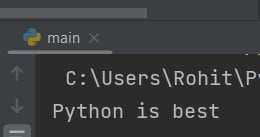Python has multiple ways to append to string in another string to the end. Simple and traditional is the += operator.
Note: In Python, strings are immutable, which means you cannot modify them in place. However, you can concatenate strings using the + operator or by using the += operator to append to a string variable. Here are a few examples:
Python append to a string
Simple example code.
s = "Python "
add_string = "is best"
# adding one string to another
s += add_string
print(s)
Output:

Join Strings Into a String using join()
s = "Python "
add_string = "is best"
# adding one string to another
res = "".join((s, add_string))
print(res)Append one string to another using f-string
s = "Python "
add_string = "is best"
# adding one string to another
res = f'{s}{add_string}'
print(res)
Using the __add__ method
s = "Python "
add_string = "is best"
# adding one string to another
res = s.__add__(add_string)
print(res)
Using format()
s = "Python "
add_string = "is best"
# adding one string to another
res = "{}{}".format(s, add_string)
print(res)
Which is the preferred way to concatenate a string in Python
Answer: The best way of appending a string to a string variable is to use + or +=. This is because it’s readable and fast. They are also just as fast, which one you choose is a matter of taste, the latter one is the most common. Here are the timings with the timeit module:
a = a + b:
0.11338996887207031
a += b:
0.11040496826171875Source: https://stackoverflow.com/questions/12169839
Do comment if you have any doubts or suggestions on this Python append topic.
Note: IDE: PyCharm 2021.3.3 (Community Edition)
Windows 10
Python 3.10.1
All Python Examples are in Python 3, so Maybe its different from python 2 or upgraded versions.